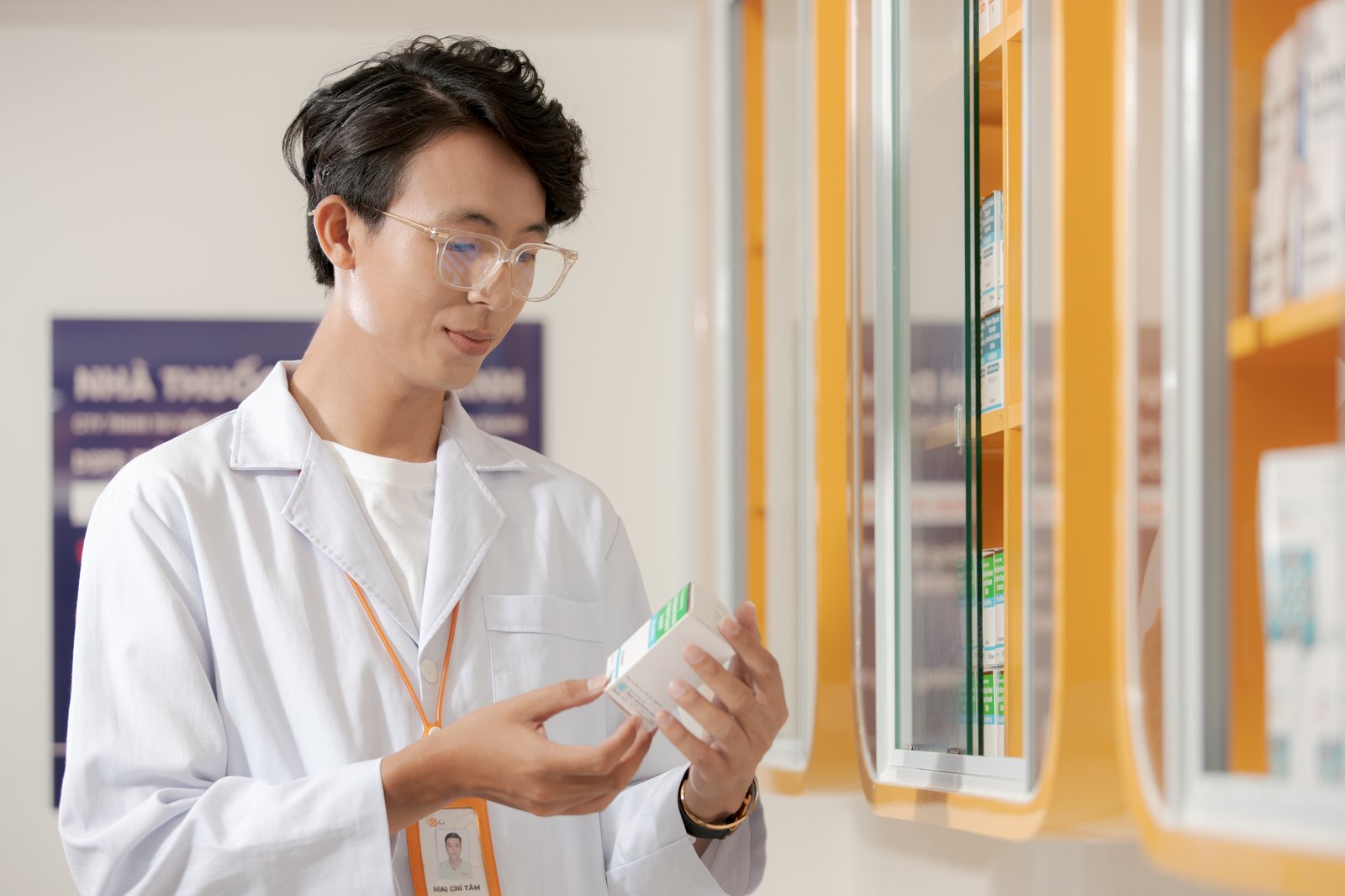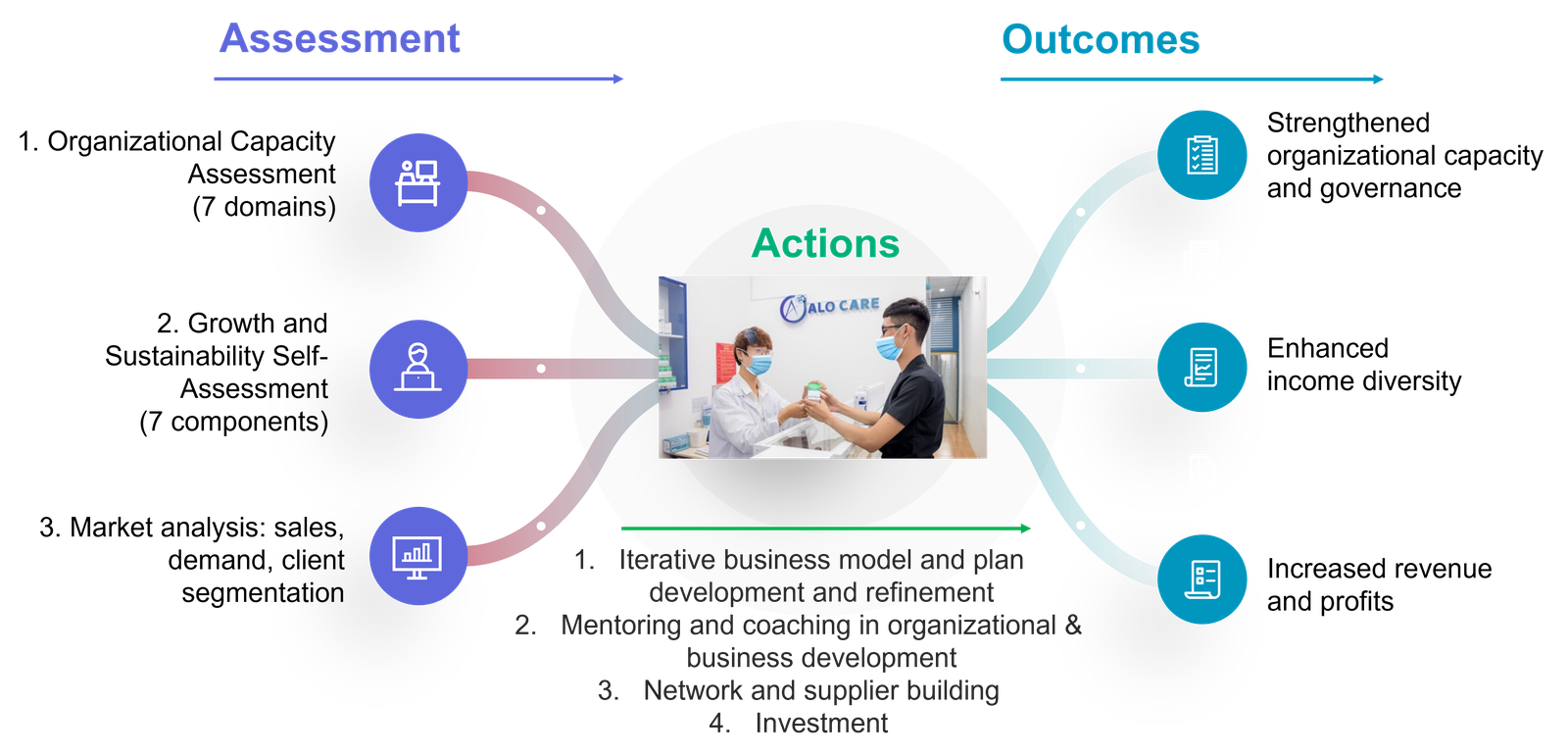Back in 2014, Vietnam’s HIV response was in a precarious position. New infections were on the rise among key populations—those at highest risk for HIV, including men who have sex with men, transgender women, drug users, sex workers, and their partners. In addition, a reduction in international funding for HIV threatened the government’s ability to respond to key populations’ HIV and broader health care needs. An expansion of peer-delivered service models was urgently needed to ensure key populations had access to quality HIV prevention and treatment services.
At the same time, Vietnam’s 2014 Enterprise Law encoded a first-ever social enterprise status into national legal frameworks. This enabled community-based organizations (CBOs) to legally register as businesses and diversify their commercial activities.
With this momentum, United States Agency for International Development (USAID)/PATH Healthy Markets, an eight-year initiative funded by the US President’s Emergency Plan for AIDS Relief (PEPFAR), began to deliver tailored technical assistance to key population–led groups in business development and growth.
Meeting key populations’ needs through transformative business models
Healthy Markets engaged in five major steps to guide the growth and maturation of key population–led businesses:
- Conducted market assessments to understand the barriers to key population use of HIV goods and services.
- Matched groups to viable market opportunities, including condom sales.
- Nurtured CBO and social enterprise growth through grants and targeted capacity-building.
- Supported new health care models, as well as the replicability and scale-up of existing models.
- Secured additional capital for sustainability.
1. Conducting market assessments
Beginning in 2014, Healthy Markets partnered with CBOs, provinces, and the Ministry of Health to identify supply and demand gaps in the country’s HIV response, as well as new opportunities to achieve national and provincial goals. Through a combination of consumer surveys, market evaluations, business capability assessments, and ecosystem mapping, the project was able to pinpoint specific ways for CBOs to meet community demand and further their own business goals. For some, this entailed pursuing social enterprise status to expand their business horizons and generate greater income, while others were focused on incorporating smaller-scale health goods sales and distribution through a CBO-business model.
2. Matching groups to opportunities
Using assessment findings, Healthy Markets helped match CBOs to viable market opportunities, including condom sales, and develop business plans outlining their commercial goals.
This was an important first step for key population–led businesses to grow their business competencies. Groups who were successful were matched to further business prospects, including sales of lubricants and low dead space syringes. By 2017, 27 CBOs and social enterprises were selling condoms and lubricant.
3. Nurturing business growth
As a next step to validating potential business models in the community, Healthy Markets launched a series of small grant schemes (including an Innovation Fund) through which select CBOs and social enterprises received intensive business development support and a mixed grant/loan award package to bring their business ideas to life.
At the same time, Healthy Markets partnered with a leading local social enterprise incubator, the Centre for Social Initiatives Promotion, to conduct organizational capacity assessments and offer legal assistance for CBOs to register as social enterprises and open clinics or other commercial businesses.
With this support, the first key population–led social enterprises were established in 2015, and Glink clinic was subsequently opened in 2016 as the first-ever key population–led private clinic in the country. These groups soon began to offer community-based HIV testing and HIV self-testing as part of national pilot programs, coupled with other HIV prevention and referral services.
4. Supporting new models
Expanding the types of goods and services offered enables organizations to increase foot traffic, diversify income, and generate revenue. Building on the delivery of HIV testing services and sales of condoms and other health products, Healthy Markets supported organizations in offering various HIV and primary health care services while advocating for the policy change needed to enable these ventures. Additionally, the project supported clinics to franchise and replicate their brands across the country.

On-site pharmacies enable clinics to expand their commercial revenue and meet clients’ needs all in one place. Photo: Glink social enterprise.
5. Securing additional capital
From 2021 onward, Healthy Markets mapped out additional capital sources to fuel CBO and social enterprise growth ventures. Organizations at early stages of growth were matched, linked, and supported in proposal development to source low-risk grant funding, and more developed organizations were assisted in securing growth grants to fund the introduction of new services or service models.
The Healthy Markets team also developed comprehensive service operating procedures, training tools, and quality improvement methods to support expanded key population clinic offerings—including hormone counseling for transgender populations; screening and treatment of sexually transmitted infections, viral hepatitis, and noncommunicable diseases; and mental health care.
“With Healthy Markets’ support, Alo Care clinic has grown considerably and is now able to deliver affordable, community-based health services that have been lifechanging for our clients.”— Thuan Minh Nguyen, Director, Alo Care key population–led clinic
Supporting a sustainable network of businesses led by key populations
Over eight years, Healthy Markets partnered with 44 key population–led CBOs—29 of which opted to develop as sustainable health businesses. As a result, 14 social enterprises have been formed and are operating 18 primary care clinics across the country.
Beyond the clinic model, some groups are now forging new ventures, such as a new health care and beauty business model led by a transgender social enterprise, Venus, and a first-ever community-based pharmacy business, established by Smile social enterprise.
Through business planning and tailored technical assistance, mentoring, and co-learning, Healthy Markets has helped key population–led businesses effectively frame their business goals for the future, pinpoint support needs, become more financially stable and self-reliant, and measure progress over time.

How key population organizational capacity and growth assessments are used to inform key actions and achieve outcomes.
Next STEPS
The five-year, PATH-led Support for Technical Excellence and Private Sector Sustainability in Vietnam (STEPS) project, funded by PEPFAR through USAID/Vietnam, will further boost the sustainability of community-based, private-sector HIV service delivery and scale the progress made during Healthy Markets’ eight years of operation.
This will include leveraging platforms for key population–led business learning and advancement, such as through the new Glink Academy, a peer-to-peer learning and incubation initiative that nurtures young community start-ups. It will also include building partnerships with key diagnostics, pharmacy, and technology partners such as Docosan, a local e-commerce and telemedicine platform, to facilitate access to new products and markets for key population–led businesses.
On the financing side, STEPS is working to identify investment opportunities and prime growth-stage key population–led businesses to attract debt, equity, and blended financing, while also matching groups to low-risk capital to develop new business offerings, such as telemedicine and home health care.



